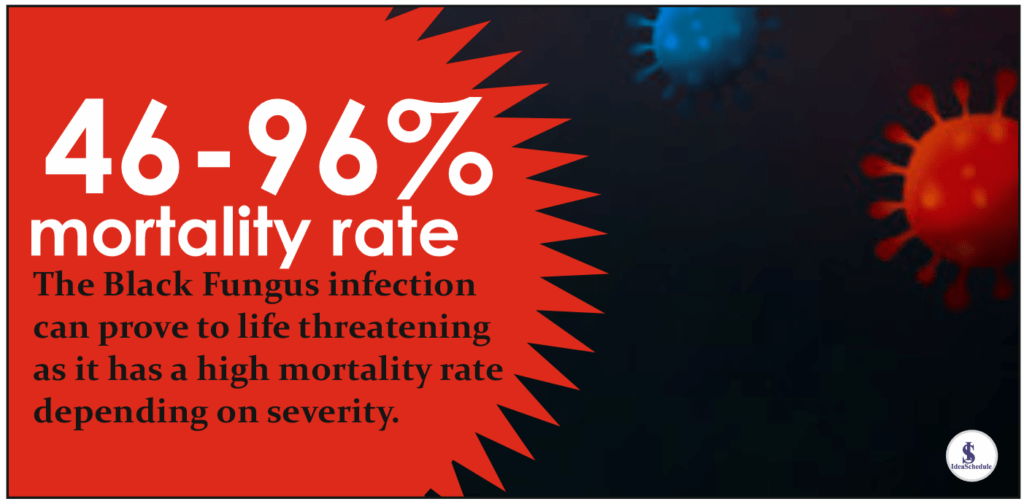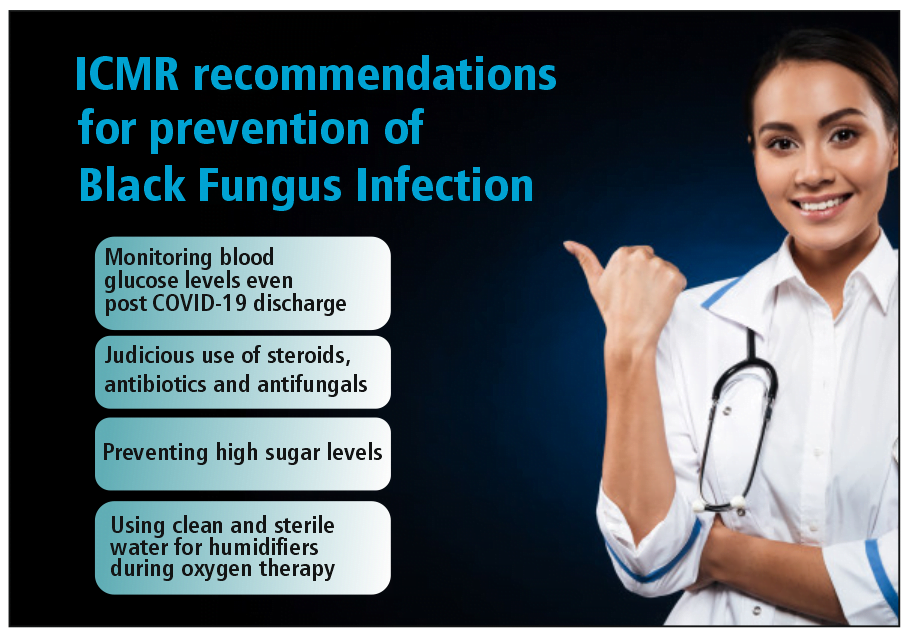Ravaged by the second COVID pandemic wave and still reeling under the immense loss of lives and livelihood, India is dealt another cruel blow of fate. COVID and Black Fungus Infection, related news keep flashing in every news channel these days. This “new” kind of mysterious infection is sending fresh panic waves into the already scarred mental state of the nation.
Black Fungus is the new scourge. The scientific name of the Black Fungal disease is Mucormycosis. The latest dreaded word added to the battered collective conscience of the country – Mucormycosis is a fungal infection, reported mostly amongst immunity compromised COVID-19 patients.
What is Black Fungus disease?
Black Fungus is fundamentally a fungal infection. Black Fungal Infection or Mucormycosis is a disease caused by a group of mold known as Mucoromycetes.
Mucoromycetes is a group of fungi that naturally occur as molds, mildews, rusts. They produce spores which are very tiny particles, just like pollen produced by flowers.
How does one get infected with Black Fungus?
The infection starts simply with harmless inhalation of spores of Black Fungus.
Black Fungus release spores into their surroundings. It is their mechanism of reproduction. This releasing of its spores is akin flowering plants releasing their pollens during the spring season. A person upon inhaling the spores of black fungus can get infected with Black Fungus infection. It infects sinuses in our nasal cavity first. It can then spread to eyes, lungs and even to the brain.
Is the infection of Black Fungus fatal?
Medical fraternity have declared that Black Fungus infection or Mucormycosis infection starts from the nose and spreads to the eyes and brain. It can also directly affect the brain which can be fatal.

Who is at a higher risk of contracting Black Fungus Infection?
Media reports, COVID stricken patients are contracting Black Fungus disease. Not only COVID patients but patients on medications for health problems other than COVID-19 having compromised immunity too are contracting the Black Fungus infection. Hence persons with acute compromised immunity are at higher risk than a healthy individual.

There are many ways in which the immunity is compromised. However, ICMR has identified five medical conditions that puts an individual in the high-risk category to contract Mucormycosis:
- Uncontrolled Diabetes Mellitus
- Immunosuppression due to long term use of steroids
- Prolonged stay in ICU due to other medical conditions
- Comorbidities – post-transplant/malignancy
- Voriconazole therapy
How does it turn fatal?
The initial assessment of the Black Fungal Infection disease is marked by a reduction in the ability of the immune system to fight environmental pathogens. This peculiar pathogenicity of Mucormycosis is corroborated by the Indian Council of Medical Research (ICMR).
Mucormycosis is a malignant form of fungal infection. In the acute form, the infection grows around the blood carrying vessels. Mucormycosis turns to be life-threatening especially in patients with diabetes and severely compromised immunity.
Under normal conditions, the immune system of a healthy individual is capable to mount a strong enough immune response to fight and destroy the spores of Black Fungus inhaled. But the immune system of people infected with Coronavirus is considerably weakened. The reduced immunity of a COVID positive individual could also be due to other health issues such as acute diabetes.
Additionally, even certain medications prescribed for cancer treatment substantially weakens the immune system putting such an individual at a higher risk of contracting Black Fungal infection. The percentage of such individuals having fatal outcomes due to the combined effects of COVID, and Black Fungal Infection are very high.
Hence, the immune system of a COVID patient or an individual with suppressed immunity due to use of steroids is unable to put up a fight to the onslaught of Black Fungus infection. So, Black Fungus turns fatal when it enhances the severity of other diseases including Diabetes, HIV/AIDs, COVID and other diseases.

What are the symptoms of Black fungus or Mucormycosis one should be aware of to tackle it?
ICMR describes that a person infected with Black Fungus experiences pain and redness around the eyes and/or nose as the spores of Mucormycetes attack the blood vessels of these two organs first. With the increase in severity of the infection, one experiences fever, headache, cough, shortness of breath, bloody vomits, and altered mental status.
COVID-19 patients, diabetics or individuals with weakened immunity must also notice the following signs and symptoms for Black Fungus infection:
- Sinusitis – it is nasal congestion, blackish or bloody nasal discharge, the sensation of pain on the cheekbones
- One-sided facial pain, numbness or swelling
- Onset of Blackish discoloration of the nose bridge/palate
- Toothache, loosening of teeth, pain in the jaws
- Blurred or double vision with pain; fever, appearance of skin lesion; thrombosis (blockage of blood vessels) and necrosis (death of tissues due to lack of blood supply in the infected tissue)
- Chest pain, pleural effusion (fluid filling in the covering of lungs), haemoptysis (coughing out blood), extreme discomfort in breathing
Which parts of the body are more prone to Black Fungal Infection?
First you must understand that it is a fact that most fungi are harmless to humans, but some can cause diseases under specific conditions. Fungi reproduce by releasing spores. One gets infected either by direct contact or even by inhaling the black fungus spores. Fungal infections mostly affect skin, nails, and lungs. Fungi are capable of penetrating through skin to infect internal organs. Such an infection causes a body-wide systemic infection.
Doctors confirm that Mucormycosis infection starts from the nose and spreads to the eyes and brain. It can also directly affect the brain which can be fatal. Since Nose and paranasal sinuses are closely connected to the eye and brain, the black fungus spores can invade and infect these organs, if not treated. The infection aggravates with the invasion of fungus into the blood vessel. Once the infection reaches the bloodstream, the infection spreads faster. It can also block the infected blood vessels resulting in complete loss of blood supply to the surrounding tissue.
Why COVID-19 Patients are Contracting Mucormycosis Now?
Black fungus or Mucormycosis existed even before the COVID-19 pandemic. There were only 2-3 cases of Black Fungal Infection reported in a year and that too in severely diabetic patients. But now, during the second wave of COVID in India cases have multiplied hundred times
One of the main reasons is that most of the COVID-19 patients with immunosuppressed immunity are in the high-risk category and are falling prey to black fungus infection.
Secondly, moderate, and severe COVID-19 patients are often treated with steroids. And any diabetic patient when treated with steroids as part of COVID-19 treatment, it leads to a spike in the blood sugar level which in turn results in fatal complications. Hence, managing the use of steroids and controlling blood glucose levels is critical to saving lives lost to this rare fungal infection.
Thirdly, antibiotics are prescribed liberally to all patients. Antibiotics as we know kill good bacteria too. Gut bacteria or our microbiome plays an important role in our immune system. Antibiotics are strangely creating an ideal condition for the fungus by paving a clear passage to travel deep into the body.
How to prevent and treat Black Fungus infection or Mucormycosis?
It is understood that Black fungus infection is contracted by inhalation and direct touch. Therefore the first and foremost prevention is wearing a good quality mask. Secondly, avoid touching the nose and mouth and other body parts. Keeping the surrounding clean.
Do follow all precautions recommended for COVID pandemic. Doctors strongly recommend wearing a mask, even after recovering from COVID-19 because it takes up to three months for the immunity to return to its full vigour. During the recovery phase, there exist the risk of inhaling fungal spores from the air contracting the Black Fungus infection.
Since Black Fungal infection is a rare fungal infection, people had little information and so pay little heed to the symptoms. But now with many fatalities recently, awareness about it has increased. People are approaching the doctors at the earliest signs of symptoms. In case the infection is at the sinus level only, treatment is available. However, once it reaches the eyes, there is no option other than the removal of the eye to stop the spread of the infection.
ICMR suggests following steps to prevent Mucormycosis:
- Monitoring blood glucose levels post COVID-19 discharge.
- Preventing high sugar levels.
- Judicious use of steroids, antibiotics, and antifungals.
- Using clean, sterile water for humidifiers during oxygen therapy.

Like any disease prevention is the best cure. Early diagnosis is the key. Always consult a doctor. Immunomodulating drugs should be discontinued. Immunomodulating drugs are those which change the response of the immune system. Antifungal therapy has also been advised for at least four to six weeks. Amphotericin B is being used for treatment, leading to a sudden increase in demand in some states.
Be Safe. Stay Safe


1 comment
[…] of India in the wake of increase in Black Fungus infections in the country made a statement on Black Fungus Infection on his twitter […]